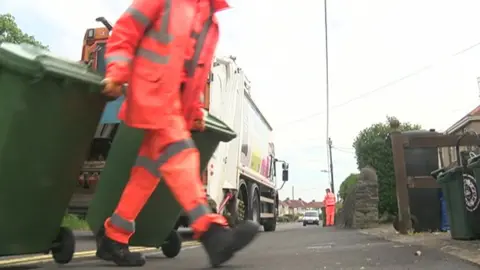Cambridgeshire biofuel bin lorries 'cut carbon by 90%'
 BBC
BBCBin lorries which ran on biofuel instead of diesel cut carbon emissions by 90%, councils said.
Eight lorries from a fleet of about 50 were powered by hydrotreated vegetable oil (HVO) for a two-month trial in Cambridge and South Cambridgeshire.
A "significant proportion" of carbon emissions at both councils derive from diesel bin lorries, the councils said.
The local authorities are switching to electric and hydrogen lorries but said biofuel could be a stop-gap.
Rosy Moore, executive councillor for environment at Cambridge City Council, said: "We are not prepared to simply continue running diesel trucks well into the future until the entire fleet is electric, and this trial of vegetable oil-based fuel provides a useful interim solution."
No modifications are required to use HVO in the bin lorries, which can be filled with HVO rather than diesel, the councils said.
Greater Cambridge Shared Waste, which collects recycling and rubbish from around 127,000 households, runs two fully electric bin lorries, with a third on order.
A solar farm to power further electric bin lorries is planned at its service depot at Waterbeach.

Find BBC News: East of England on Facebook, Instagram and Twitter. If you have a story suggestion please email [email protected]
